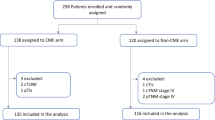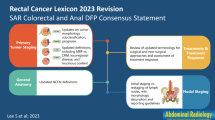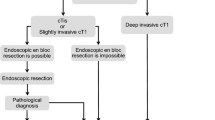Abstract
Background
Complete mesocolic excision (CME) is advocated based on oncologic superiority, but not commonly performed in North America. Many data are case series with few comparative studies. Our aim was to perform a systematic review comparing outcomes between CME and non-CME colectomy.
Methods
A systematic review was performed according to PRISMA guidelines of MEDLINE, EMBASE, HealthStar, Web of Science, and Cochrane Library. Studies were included if they compared conventional resection (non-CME) to CME for colon cancer. Quality was assessed using methodological index for non-randomized studies (MINORS). The main outcome measures were short-term morbidity and oncologic outcomes. Weighted pooled means and proportions with 95% CI were calculated using a random-effects model when appropriate.
Results
Out of 825 unique citations, 23 studies underwent full-text reviews and 14 met inclusion criteria. Mean MINORS score was 13.3 (range 11–15). The mean sample size in CME group was 1166 (range 45–3756) and 945 (range 40–3425) in non-CME. Four papers reported plane of dissection, with CME plane achieved in 85.8% (95% CI 79.8–91.7). Mean OR time in CME group was 167 min (163–171) and 138 min (135–142) in conventional group. Perioperative morbidity was reported in six studies, with pooled overall complications of 22.5% (95% CI 18.4–26.6) for CME and 19.6 (95% CI 13.6–25.5) for non-CME. Anastomotic leak occurred in 6.0% (95% CI 2.2–9.7) of CME resections versus 6.0% (95% CI 4.1–7.9) in non-CME. CME had more lymph nodes, longer distance to high tie, and specimen length in all studies. Nine studies compared long-term oncologic outcomes and only three reported statistically significant higher disease-free or overall survival in favor of CME. Local recurrence was lower after CME in two of four studies.
Conclusions
The quality of evidence is limited and does not consistently support the superiority of CME. Better data are needed before CME can be recommended as the standard of care for colon cancer resections.

Similar content being viewed by others
References
Heald RJ, Husband EM, Ryall RD (1982) The mesorectum in rectal cancer surgery—the clue to pelvic recurrence? Br J Surg 69:613–616
Wibe A, Moller B, Norstein J, Carlsen E, Wiig JN, Heald RJ, Langmark F, Myrvold HE, Soreide O, Norwegian Rectal Cancer G (2002) A national strategic change in treatment policy for rectal cancer—implementation of total mesorectal excision as routine treatment in Norway. A national audit. Dis Colon Rectum 45:857–866
Khani MH, Smedh K (2010) Centralization of rectal cancer surgery improves long-term survival. Colorectal Dis 12:874–879
Martling AL, Holm T, Rutqvist LE, Moran BJ, Heald RJ, Cedemark B (2000) Effect of a surgical training programme on outcome of rectal cancer in the County of Stockholm. Stockholm Colorectal Cancer Study Group, Basingstoke Bowel Cancer Research Project. Lancet 356:93–96
West NP, Morris EJ, Rotimi O, Cairns A, Finan PJ, Quirke P (2008) Pathology grading of colon cancer surgical resection and its association with survival: a retrospective observational study. Lancet Oncol 9:857–865
Chang GJ, Rodriguez-Bigas MA, Skibber JM, Moyer VA (2007) Lymph node evaluation and survival after curative resection of colon cancer: systematic review. J Natl Cancer Inst 99:433–441
Hohenberger W, Weber K, Matzel K, Papadopoulos T, Merkel S (2009) Standardized surgery for colonic cancer: complete mesocolic excision and central ligation—technical notes and outcome. Colorectal Dis 11:354–364
Chow CF, Kim SH (2014) Laparoscopic complete mesocolic excision: West meets East. World J Gastroenterol 20:14301–14307
Bertelsen CA, Neuenschwander AU, Jansen JE, Kirkegaard-Klitbo A, Tenma JR, Wilhelmsen M, Rasmussen LA, Jepsen LV, Kristensen B, Gogenur I, Copenhagen Complete Mesocolic Excision Study, Danish Colorectal Cancer Group (2016) Short-term outcomes after complete mesocolic excision compared with ‘conventional’ colonic cancer surgery. Br J Surg 103:581–589
Hogan AM, Winter DC (2009) Complete mesocolic excision (CME): a “novel” concept? J Surg Oncol 100:182–183
Gouvas N, Agalianos C, Papaparaskeva K, Perrakis A, Hohenberger W, Xynos E (2016) Surgery along the embryological planes for colon cancer: a systematic review of complete mesocolic excision. Int J Colorectal Dis 31:1577–1594
Sondenaa K, Quirke P, Hohenberger W, Sugihara K, Kobayashi H, Kessler H, Brown G, Tudyka V, D’Hoore A, Kennedy RH, West NP, Kim SH, Heald R, Storli KE, Nesbakken A, Moran B (2014) The rationale behind complete mesocolic excision (CME) and a central vascular ligation for colon cancer in open and laparoscopic surgery. Int J Colorectal Dis 29:419–428
West NP, Kobayashi H, Takahashi K, Perrakis A, Weber K, Hohenberger W, Sugihara K, Quirke P (2012) Understanding optimal colonic cancer surgery: comparison of Japanese D3 resection and European complete mesocolic excision with central vascular ligation. J Clin Oncol 30:1763–1769
Slim K, Nini E, Forestier D, Kwiatkowski F, Panis Y, Chipponi J (2003) Methodological index for non-randomized studies (minors): development and validation of a new instrument. ANZ J Surg 73:712–716
Bertelsen CA, Bols B, Ingeholm P, Jansen JE, Neuenschwander AU, Vilandt J (2011) Can the quality of colonic surgery be improved by standardization of surgical technique with complete mesocolic excision? Colorectal Dis 13:1123–1129
Bertelsen CA, Neuenschwander AU, Jansen JE, Wilhelmsen M, Kirkegaard-Klitbo A, Tenma JR, Bols B, Ingeholm P, Rasmussen LA, Jepsen LV, Iversen ER, Kristensen B, Gogenur I, Danish Colorectal Cancer Group (2015) Disease-free survival after complete mesocolic excision compared with conventional colon cancer surgery: a retrospective, population-based study. Lancet Oncol 16:161–168
West NP, Hohenberger W, Weber K, Perrakis A, Finan PJ, Quirke P (2010) Complete mesocolic excision with central vascular ligation produces an oncologically superior specimen compared with standard surgery for carcinoma of the colon. J Clin Oncol 28:272–278
West NP, Sutton KM, Ingeholm P, Hagemann-Madsen RH, Hohenberger W, Quirke P (2010) Improving the quality of colon cancer surgery through a surgical education program. Dis Colon Rectum 53:1594–1603
Tagliacozzo S, Tocchi A (1997) Extended mesenteric excision in right hemicolectomy for carcinoma of the colon. Int J Colorectal Dis 12:272–275
Kotake K, Mizuguchi T, Moritani K, Wada O, Ozawa H, Oki I, Sugihara K (2014) Impact of D3 lymph node dissection on survival for patients with T3 and T4 colon cancer. Int J Colorectal Dis 29:847–852
Kotake K, Kobayashi H, Asano M, Ozawa H, Sugihara K (2015) Influence of extent of lymph node dissection on survival for patients with pT2 colon cancer. Int J Colorectal Dis 30:813–820
Galizia G, Lieto E, De Vita F, Ferraraccio F, Zamboli A, Mabilia A, Auricchio A, Castellano P, Napolitano V, Orditura M (2014) Is complete mesocolic excision with central vascular ligation safe and effective in the surgical treatment of right-sided colon cancers? A prospective study. Int J Colorectal Dis 29:89–97
Ishihara S, Otani K, Yasuda K, Nishikawa T, Tanaka T, Tanaka J, Kiyomatsu T, Kawai K, Hata K, Nozawa H, Kazama S, Yamaguchi H, Sunami E, Kitayama J, Sugihara K, Watanabe T (2016) Prognostic impact of lymph node dissection is different for male and female colon cancer patients: a propensity score analysis in a multicenter retrospective study. Int J Colorectal Dis 31:1149–1155
Merkel S, Weber K, Matzel KE, Agaimy A, Gohl J, Hohenberger W (2016) Prognosis of patients with colonic carcinoma before, during and after implementation of complete mesocolic excision. Br J Surg 103:1220–1229
Olofsson F, Buchwald P, Elmstahl S, Syk I (2016) No benefit of extended mesenteric resection with central vascular ligation in right-sided colon cancer. Colorectal Dis 18:773–778
Storli KE, Sondenaa K, Furnes B, Nesvik I, Gudlaugsson E, Bukholm I, Eide GE (2014) Short term results of complete (D3) vs. standard (D2) mesenteric excision in colon cancer shows improved outcome of complete mesenteric excision in patients with TNM stages I-II. Tech Coloproctol 18:557–564
Thorsen Y, Stimec B, Andersen SN, Lindstrom JC, Pfeffer F, Oresland T, Ignjatovic D (2016) Bowel function and quality of life after superior mesenteric nerve plexus transection in right colectomy with D3 extended mesenterectomy. Tech Coloproctol 20:445–453
Killeen S, Mannion M, Devaney A, Winter DC (2014) Complete mesocolic resection and extended lymphadenectomy for colon cancer: a systematic review. Colorectal Dis 16:577–594
Kontovounisios C, Kinross J, Tan E, Brown G, Rasheed S, Tekkis P (2015) Complete mesocolic excision in colorectal cancer: a systematic review. Colorectal Dis 17:7–16
Kobayashi H, West NP, Takahashi K, Perrakis A, Weber K, Hohenberger W, Quirke P, Sugihara K (2014) Quality of surgery for stage III colon cancer: comparison between England, Germany, and Japan. Ann Surg Oncol 21(Suppl 3):S398–S404
Ishiguro M, Higashi T, Watanabe T, Sugihara K, Japanese Society for Cancer of the Colon and Rectum (2014) Changes in colorectal cancer care in Japan before and after guideline publication: a nationwide survey about D3 lymph node dissection and adjuvant chemotherapy. J Am Coll Surg 218:969–977
Colon Cancer Laparoscopic or Open Resection Study Group, Buunen M, Veldkamp R, Hop WC, Kuhry E, Jeekel J, Haglind E, Pahlman L, Cuesta MA, Msika S, Morino M, Lacy A, Bonjer HJ (2009) Survival after laparoscopic surgery versus open surgery for colon cancer: long-term outcome of a randomised clinical trial. Lancet Oncol 10:44–52
Fleshman J, Sargent DJ, Green E, Anvari M, Stryker SJ, Beart RW Jr, Hellinger M, Flanagan R Jr, Peters W, Nelson H, Clinical Outcomes of Surgical Therapy Study Group (2007) Laparoscopic colectomy for cancer is not inferior to open surgery based on 5-year data from the COST Study Group trial. Ann Surg 246:655–662 (discussion 662–654)
Jayne DG, Guillou PJ, Thorpe H, Quirke P, Copeland J, Smith AM, Heath RM, Brown JM, Group UMCT (2007) Randomized trial of laparoscopic-assisted resection of colorectal carcinoma: 3-year results of the UK MRC CLASICC Trial Group. J Clin Oncol 25:3061–3068
Lacy AM, Delgado S, Castells A, Prins HA, Arroyo V, Ibarzabal A, Pique JM (2008) The long-term results of a randomized clinical trial of laparoscopy-assisted versus open surgery for colon cancer. Ann Surg 248:1–7
Coffey JC, Dockery P (2016) Colorectal cancer: surgery for colorectal cancer—standardization required. Nat Rev Gastroenterol Hepatol 13:256–257
McSorley ST, Horgan PG, McMillan DC (2016) The impact of the type and severity of postoperative complications on long-term outcomes following surgery for colorectal cancer: a systematic review and meta-analysis. Crit Rev Oncol Hematol 97:168–177
Author information
Authors and Affiliations
Corresponding author
Ethics declarations
Disclosures
Dr. A. Sender Liberman is on the medical advisory committee on ERAS for Merck, and on the advisory committee meeting for Novadaq. Drs. Noura Alhassan, Mei Yang, Nathalie Wong-Chong, Patrick Charlebois, Barry Stein, Gerald M. Fried, and Lawrence Lee have no conflicts of interest or financial ties to disclose.
Rights and permissions
About this article
Cite this article
Alhassan, N., Yang, M., Wong-Chong, N. et al. Comparison between conventional colectomy and complete mesocolic excision for colon cancer: a systematic review and pooled analysis. Surg Endosc 33, 8–18 (2019). https://doi.org/10.1007/s00464-018-6419-2
Received:
Accepted:
Published:
Issue Date:
DOI: https://doi.org/10.1007/s00464-018-6419-2




